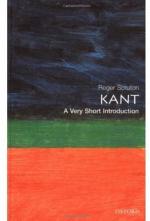|
This section contains 890 words (approx. 3 pages at 400 words per page) |

|
The Illusions of Logic
Kant's philosophy is in many ways a reaction against the Rationalist philosophical systems of thinkers like Gottfried Leibniz. According to the Rationalism, one can know achieve objective knowledge of the world only through reason. Sensation is flawed and bound to an individual's perspective, but, they argue, one can see the world like God does through the use of pure logic. Kant believed that experience was crucial to any knowledge. He strongly disagreed with the notion that one could ever achieve an entirely perspective-less notion.
Much of Kant's writing deals with refuting specific Rationalist arguments. In particular, he was interested in disproving the traditional arguments for God's existence, though he himself did believe in God. He divided the arguments into three categories: arguments from design, cosmological arguments, and ontological arguments. Arguments from design attempted to prove God exists by pointing to the "obvious" signs of design...
|
This section contains 890 words (approx. 3 pages at 400 words per page) |

|




